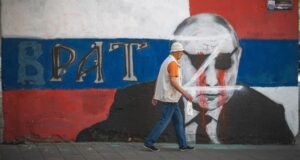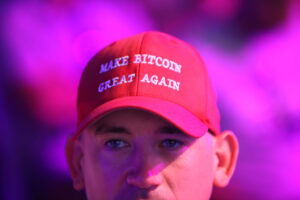Chugging down the Danube in a fisherman’s boat, past the unrecognised exclave known as Liberland, it’s hard to reconcile fantasy with reality. This patch of land — lushly forested, mosquito-ridden and boggy — remains unclaimed by neighbouring Croatia and Serbia, allowing a coterie of libertarian crypto enthusiasts to claim it as a nominally-sovereign micronation. But this sleepy cartographical quirk is a far cry from the visionary design generated by Zaha Hadid Architects to represent Liberland in the Metaverse, where silhouetted avatars stroll down deforested avenues lined with grand, neo-futurist architecture.
The idea of setting up an “independent” nation has always been attractive to libertarians, even though a half-century of attempts to establish tax-free idylls have produced no tangible results beyond angering locals and wasting the pocket change of billionaires like Peter Thiel. Partly in response to this, the more artistic tradition of “micronations” has been overtaken by a particular trend of Bitcoin-fuelled ultra-libertarianism, which implies less a release from state repression than a form of anarcho-capitalism. This vision has more in common with Dubai’s brand of free-market authoritarianism — a vision of ultra-rich luxury and labour exploitation — than any true utopian ideal.
Vit Jedlička, a ruddy-cheeked, stout-chested libertarian ideologue and self-styled President of Liberland, is as emphatic as he is energetic. “We are not a micronation, but a nation of 700,000 people, with embassies in 80 nations, and relations with countries like Haiti, Somaliland, and Malawi. We’re serious about getting Liberland set up as a country.” Never one to undersell his project, Jedlička clearly has tremendous fun barrelling around the world promoting Liberland. Nominally based out of this scrap of marshland the size of Gibraltar, but largely operating online, it’s a Web-3 nation: businesses unfettered from regulation, a skeleton state providing only basic protections, and “citizens” issued with voting credits based on the amount of voluntary tax paid.
Never mind that none of those would-be citizens actually live in Liberland — instead there is a handful of activists moored downstream on a houseboat, under the close supervision of the Croatian police. Never mind that its diplomacy is rather more limited than Jedlička suggests, with the citizens of Malawi recently ridiculing their government for getting involved with a nation that is never likely to exist. The President is always ready with a litany of soon-to-be realised projects and promises, hinting at deals and meetings with billionaires and politicians. The crash in the crypto market is a blip; a Liberland houseboat has been torched, but there will be an insurance payout. Every potential threat is recast as proof his project will succeed.
We first meet in a half-finished holiday camp Jedlička has purchased on the Serbian side of the river. And there is a clear tension between this “eco-village” (a “diaspora” site where Liberland’s first “settlers” will train in survival and negotiation skills) and his Serbian supporters’ frustration at the lack of a clear business plan. But, even if its “ambassadors” are paid lobbyists or random Bitcoin enthusiasts, Liberland does have more political reach than other libertarian micronations. This is partly a product of Jedlička’s gregarious personality, which has kept the project alive since it began in 2015. Due to an arcane, post-Yugoslavian boundary dispute, neither Serbia nor Croatia prefer to lay claim to the 7km2 of territory, leaving it — Jedlička says — “terra nullia” for the taking. (The Croatian authorities disagree, tolerating the Liberlanders’ presence on their territory, but denying them access to the contested patch of land.)
But this reach is also thanks to the political moment into which Jedlička announced his project. The conservative Czech politician found a natural home in the heady world of Web-3 technologies, securing capital backing (through cryptocurrency investments) and the means to place Liberland’s constitution on the blockchain in perpetuity. He generated a growing, global interest in his ultra-libertarian vision — resulting in collaborations with big-name architects, the Polkadot cryptocurrency development fund, and a host of global Bitcoin fans, including the Liberian (not Liberlandian) Consul General to Dubai, currently living on a barge just outside the UAE in imitation of Liberland’s ideals.
For Jedlička, these international supporters “understand the economic potential of a truly free zone in the European Union… they like the vision, and want to watch”. He presents it as “combining aspects of the most successful states to date”, bringing together Singapore-style meritocracy, the town-hall democracy of early America, and the low-tax environment of European microstates such as Monaco or Liechtenstein.
In practice, such a system would face immediate issues. As we ride rickety bikes along the course of the Danube, Jedlička says he prefers the “right to set up a lemonade stand in the street over the right to cycle down it naked”, suggesting that the freedom to practice business should trump personal liberties. Yet this approach opens the door to all manner of abuses, since those individuals or businesses able to spend the most money will also be able to determine law and policy, by securing the most voting credits. Already, in Serbia’s Liberland-linked tourist village, a promised wage of €600 a month has proved insufficient to retain the skilled workers needed to complete the camp, leaving it half-finished. The “non-aggression principle” proposed to prevent direct physical harm between Liberland citizens offers no protection of basic rights. There is no health or social care, workplace protections or minimum wage. To the Liberland activists, “welfare state” is a dirty word.
Other liberties would also come under threat. The project has been troubled from the outset by the question of whether free movement of peoples would be allowed, with Liberlanders congregated in the Serbian eco-village mocking the emailed residency applications of confused Middle Easterners who mistake the country for a real polity. While Jedlička generally presents an optimistic, modernising political model, Serbian supporters who drove up from Belgrade to visit their President describe themselves as proud “conspiracy theorists”. And this isn’t libertarian trolling: they cite the Protocols of the Elders of Zion and Ku Klux Klan associate Albert Pike in arguing that the world faces an imminent race war orchestrated by the same Jewish New World Order they allege was behind the Holocaust. Given no-one actually lives in Liberland, Jedlička is free to place his trust in a notional citizens’ veto to prevent abuses of rights. But it remains unclear how a clash between libertarian ideals of free movement and the survivalist, white-nationalist inclinations of many its followers would be avoided.
Jedlička is able to evade these issues through a mixture of blind confidence and the fact that his project exists only on paper — or on blockchain. A fully-fledged Liberland would resemble real-world microstates, in that it would rely on either the continued “mining” of cryptocurrencies or on accommodating international capital as a tax haven. Quoting a sympathetic, Belgrade-based think tank, Jedlička suggests a tax haven on the Danube would bring a GDP boost to neighbouring states.
But other libertarian projects have failed following local opposition: the 1972 “Republic of Minerva”, an attempt to establish a microstate on reclaimed land in the ocean near Tonga, came a cropper when locals decided not to allow rich Westerners to enjoy a tax-free oasis at the expense of their fishing rights. More recently, a “seasteading” project which aimed to establish a floating utopia near Tahiti, initially backed by libertarian billionaire Peter Thiel, met a similar fate, collapsing following angry protests from locals opposing a “megalomaniacal” project with no clear benefit to the local economy.
Recent attempts to establish crypto-friendly communities of expats in Puerto Rico and Central America have also foundered. Notoriously, El Salvador has witnessed a protracted effort by its president, Nayib Bukele, to force locals into using Bitcoin, while attracting the Western crypto elites to free-market resorts intended to serve as Bitcoin playgrounds. The attempted pivot to virtual currency has been met with indifference and protest. Following the recent crypto crash, the nation came close to defaulting on its sovereign debt. Bukele’s Bitcoin roll-out has also gone “hand in hand” with the introduction of a “police state” characterised by widespread arrests, detentions and torture, including the arbitrary arrest of those opposed to the government’s bitcoin policy. Liberland’s nominal finance minister Navid Saberin, a Luxembourger businessman, admits he personally visited El Salvador and found “no-one had anything good to say” about the Bitcoin pivot. Yet he also remains wholly optimistic that Bitcoin will bounce back, restoring his fortunes and justifying Bukele’s efforts.
Jedlička worries that finance journalists dismiss Liberland’s political programme as too utopian. In reality, the opposite is true. If realised, his “vision” would result in a dystopian combination: reliance on foreign capital which creates little benefit for local communities, undergirded by authoritarian excesses in defence of those elite financial interests. The Liberland proposal is not a challenge to the current economic order. It is its fullest expression, stripped of all protections, checks and balances.
But this vision has its appeal. In the surrounding states, crony capitalism beholden to EU investment has brought few benefits to ordinary people. Liberland’s President is a genuine and infectious believer in personal sovereignty, and it’s little wonder frustrated young people are attracted by his dynamic, untrammelled version of capitalism, as they are by the get-rich-quick crypto promise. And though Jedlička is keen to distance himself from more playful, performance-based micronations, the political model has also been used to register protest against authoritarianism and homogenisation. Protest projects such as Germany’s Free Republic of Wendland or New Zealand’s Independent State of Aramoana stood up against the profit-driven destruction of local communities and environments, with the latter successfully resisting the state-backed imposition of an aluminium smelter. In nearby Slovenia, the Neue Slowenische Kunst (NSK) used provocative appropriations of state insignia to critique state authoritarianism.
Though dismissed by Jedlička, this spirit of protest is inherent to both the micronation concept and the libertarian movement. There is room for a more productive critique of an admittedly exploitative global financial system rigged to benefit certain states, which also recognises the limitations of crypto and the role that tax havens and free-market ideology play within that system. For now, though, we have only Jedlička’s vision of Dubai-on-the-Danube, and its handful of loyal followers.
Disclaimer
Some of the posts we share are controversial and we do not necessarily agree with them in the whole extend. Sometimes we agree with the content or part of it but we do not agree with the narration or language. Nevertheless we find them somehow interesting, valuable and/or informative or we share them, because we strongly believe in freedom of speech, free press and journalism. We strongly encourage you to have a critical approach to all the content, do your own research and analysis to build your own opinion.
We would be glad to have your feedback.
Source: UnHerd Read the original article here: https://unherd.com/



